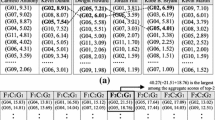Abstract
The key issue in top-k retrieval — finding a set of k documents (from a large document collection) that can best answer a user’s query — is to strike the optimal balance between relevance and diversity.
In this paper, we study the top-k retrieval problem in the framework of facility location analysis and prove the submodularity of that objective function which provides a theoretical approximation guarantee of factor \(1 - \frac{1}{e}\) for the (best-first) greedy search algorithm. Furthermore, we propose a two-stage hybrid search strategy which first obtains a high-quality initial set of top-k documents via greedy search, and then refines that result set iteratively via local search.
Experiments on two large TREC benchmark datasets show that our two-stage hybrid search strategy approach outperforms the existing ones.
Access this chapter
Tax calculation will be finalised at checkout
Purchases are for personal use only
Preview
Unable to display preview. Download preview PDF.
Similar content being viewed by others
References
Carbonell, J.G., Goldstein, J.: The use of MMR, diversity-based reranking for reordering documents and producing summaries. In: SIGIR, pp. 335–336 (1998)
Chandar, P., Carterette, B.: Diversification of search results using webgraphs. In: SIGIR, pp. 869–870 (2010)
Chapelle, O., Metlzer, D., Zhang, Y., Grinspan, P.: Expected reciprocal rank for graded relevance. In: CIKM, pp. 621–630 (2009)
Chen, H., Karger, D.R.: Less is more: Probabilistic models for retrieving fewer relevant documents. In: SIGIR, pp. 429–436 (2006)
Clarke, C.L.A., Kolla, M., Cormack, G.V., Vechtomova, O., Ashkan, A., Buttcher, S., MacKinnon, I.: Novelty and diversity in information retrieval evaluation. In: SIGIR, pp. 659–666 (2008)
Gonzalez, T.F. (ed.): Handbook of Approximation Algorithms and Metaheuristics. Chapman and Hall (2007)
Krause, A., Golovin, D.: Submodular Function Maximization. In: Tractability: Practical Approaches to Hard Problems. Cambridge University Press (2012)
Lin, H., Bilmes, J.: A class of submodular functions for document summarization. In: ACL, pp. 510–520 (2011)
Manning, C.D., Raghavan, P., Schütze, H.: Introduction to Information Retrieval. Cambridge University Press (2008)
Nemhauser, G., Wolsey, L., Fisher, M.: An analysis of approximations for maximizing submodular set functions – i. Mathematical Programming 14(1), 265–294 (1978)
Russell, S., Norvig, P.: Artificial Intelligence: A Modern Approach, 3rd edn. Prentice Hall (2009)
Santos, R.L.T., Macdonald, C., Ounis, I.: Intent-aware search result diversification. In: SIGIR, pp. 595–604 (2011)
Wang, J., Zhu, J.: Portfolio theory of information retrieval. In: SIGIR, pp. 115–122 (2009)
Zhai, C., Cohen, W.W., Lafferty, J.D.: Beyond independent relevance: Methods and evaluation metrics for subtopic retrieval. In: SIGIR, pp. 10–17 (2003)
Zuccon, G., Azzopardi, L.: Using the quantum probability ranking principle to rank interdependent documents. In: Gurrin, C., He, Y., Kazai, G., Kruschwitz, U., Little, S., Roelleke, T., Rüger, S., van Rijsbergen, K. (eds.) ECIR 2010. LNCS, vol. 5993, pp. 357–369. Springer, Heidelberg (2010)
Zuccon, G., Azzopardi, L., Zhang, D., Wang, J.: Top-k retrieval using facility location analysis. In: Baeza-Yates, R., de Vries, A.P., Zaragoza, H., Cambazoglu, B.B., Murdock, V., Lempel, R., Silvestri, F. (eds.) ECIR 2012. LNCS, vol. 7224, pp. 305–316. Springer, Heidelberg (2012)
Author information
Authors and Affiliations
Editor information
Editors and Affiliations
Rights and permissions
Copyright information
© 2014 Springer International Publishing Switzerland
About this paper
Cite this paper
Sha, C., Wang, K., Zhang, D., Wang, X., Zhou, A. (2014). Optimizing Top-k Retrieval: Submodularity Analysis and Search Strategies. In: Li, F., Li, G., Hwang, Sw., Yao, B., Zhang, Z. (eds) Web-Age Information Management. WAIM 2014. Lecture Notes in Computer Science, vol 8485. Springer, Cham. https://doi.org/10.1007/978-3-319-08010-9_3
Download citation
DOI: https://doi.org/10.1007/978-3-319-08010-9_3
Publisher Name: Springer, Cham
Print ISBN: 978-3-319-08009-3
Online ISBN: 978-3-319-08010-9
eBook Packages: Computer ScienceComputer Science (R0)




